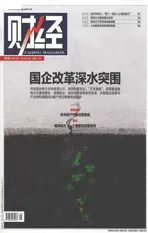Cover Story
2016-10-21
SOE Reform Makes Deep Water Breakthroughs
On Sept. 20, Baoshan Iron and Steel Group (Baosteel Group) and Wuhan Iron and Steel Group (Wuhan Steel Group), Chinas two leading steel central enterprises, began a restructuring plan which will see Baosteel Group fully take over Wuhan Steel Group to become the worlds second largest steel maker. The industry believes the marriage of the two companies can be regarded as the largest reorganization in Chinas steel industry in recent years.
Insiders say the move signals the successive launch of state-owned enterprise (SOE) stock reform and means that SOE reform is deepening. A number of experts in state-owned assets and SOE reform interviewed by Caijing said they expect the next steps of promoting mergers and reorganizations of state-owned enterprises, resolving excess capacity, forming state-owned capital investment operating companies, and overall listings of commercial SOEs will be able to achieve substantive breakthroughs.
Reviewing the Capital Account Liberalization Debate
In the past five years, there has been a sharp debate among economists about the internationalization of the RMB and the liberalization of capital projects. Zhang Shiming, a researcher at the Chinese Academy of Social Sciences, wrote an article for Caijing in 2013, in which raised eight major problems related to speeding up capital account liberalization and voiced his opposition for opening Chinas capital account too quickly. A number of scholars refuted Zhangs argument at the time.
Rethinking and reviewing the economics debate is valuable for academia. In this debate, who is right and who is wrong are not important; the important thing is which point of view is correct and which isnt, and why this is the case.
Fiscal Strategy Adjustment Under the New Normal
Chinese President Xi Jinpings proposal of the idea of the “New Normal” was equivalent to a reform mobilization order that put into motion various adjustments in economic strategy. In the second half of 2016, a decision to reduce the macro tax burden during a meeting of the Political Bureau, as well as a document on the adjustment of central and local fiscal expenditure responsibilities marked the adjustment of the fiscal strategy under the New Normal.
The main content of the new fiscal strategy is to reduce the macro tax burden and keep the central and local fiscal revenue pattern largely unchanged while having the central government take more spending responsibility. Policy recommendations that are not in line with this new fiscal strategy should be reassessed. The most urgent task for academic circles at present is how to design the implementation plan of this new fiscal strategy.
High Monetary Growth: Prejudices and Pending Questions
The expansion rate of Peoples Bank of Chinas balance sheet has far exceeded that of the quantitative easing policies of European and U.S. central banks. Chinas broad money growth as a percentage of GDP is among the worlds highest, exacerbating the publics worries about inflation, RMB depreciation pressure and real estate price bubbles. However, by looking at the past two decades, the above fears seriously contrast with actual conditions.
This article mainly answers four questions. Why didnt the monetary growth over the past 20 years bring about inflation? Why didnt the high currency growth bring about a devaluation of the RMB? Why cant high housing prices be attributed to high money growth? And finally, has the currency really been over-issued?
Tax Governance: Sicknesses and Treatment
Taxation is an important part of state governance. This year, China has been perfecting its financial management system reform through value-added tax reform and other key reforms. On this occasion, it is necessary for us to define and discuss the relationship between taxation, taxation as it relates to state governance, modern rule of law, the principles of tax collection, the advantages and disadvantages of fiscal transfers, and the role of tax scholars.
On July 30, the newly-inaugurated Tianhe Think Tank East China Finance and Taxation Forum invited various domestic and international financial and taxation experts to discuss the above issues. This issue selected a few of these articles related to this topic to present to readers.
